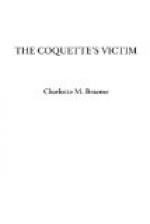“I can understand you,” said Lady Hildegarde, with a smile; “you would like to have been a knight, always looking out for some romantic adventure; you would have fought giants, released distressed princesses.”
“Overthrown all wrong and upheld all right,” he said; “that would have been my vocation.”
Lady Hildegarde went over to him and laid her hand on his head. “My dearest boy, you are young yet, but will live to see that there is as much to be done in the way of redressing wrong now as there was in the days when knights rode forth to do battle for lady fair.”
“I want some romantic adventure,” he said; “I cannot see much in the plain, common ways of man. I should like to do something that would make me a hero at once, something brave and glorious.”
“My dear boy,” she said; “God grant you may learn to distinguish true from false, true romance from mere sentiment, true gold from mere glitter.”
He looked so eager, so handsome, she kissed him with passionate love.
“I should like to have been one of King Arthur’s knights,” he said, musingly.
“My dear Basil,” said his mother; “your mind is chaos. I tell you there are giants to be fought, hydra-headed ones—the giants of ignorance, of wickedness, of injustice, and they call for a sharper, keener sword than that wielded by the knights of old.”
And there came into her heart a great fear lest her boy, who had too much imagination, too much ideality, would waste his life in dreams.
“I will tell you, Basil,” said Marion Hautville; “what I call a great hero. The man who does his duty perfectly in the state of life in which God has placed him.”
“We all do that,” replied Basil.
“Indeed we do not—you do not, to begin with. You ought now, instead of dreaming about Froissart and his barbaric times, you ought to be studying hard how to make a good master of this large estate—how to employ the vast wealth given to you—how best to serve your God, your country and those who will depend upon you.”
“Solomon in petticoats!” cried Basil, gaily, and Marion joined in his laugh.
That conversation gave Lady Carruthers many uneasy moments. She understood so well the dreamy, yet ardent, romantic temperament of the boy.
“What shall I make of him?” she said. “Will he ever learn to live contentedly here at Ulverston, doing his duty, as Marion says, to God and man? My poor Basil, he lives too late!”
She asked advice from those best fitted to give it. One and all said the same thing; there would be nothing so useful for him as a tour on the Continent, seeing plenty of the world and going into society.
So Lady Carruthers, who loved home very dearly, gave up its peaceful tranquillity, and went with Basil and Miss Hautville to Paris, where they remained some months until they saw all that was most brilliant in that brilliant capital; from there to Berlin; then on to Vienna, and Basil lost much of his dreamy nature.




